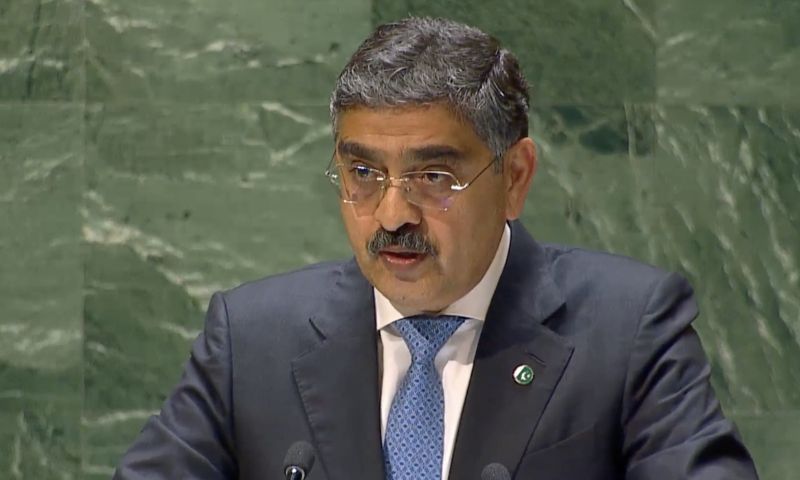PM of Pakistan at UNGA: The Role of Geo-Economics in times of geopolitics

The President of Pakistan addressed the 78th session of the UNGA held on the 22nd of September 2023. He initiated his maiden speech with the central issues in International politics, and conflicts. He highlighted the Ukrainian conflict and mentioned that conflicts prevail in more the 50+ states across the world. He discouraged the current political arena, for promoting avenues of geopolitics. He emphasized the threat posed by geopolitics and said that the world cannot afford a “Cold War 2.0”. He further went on to quote that in today’s times, our priorities should be vested in promoting Geo-economics.
Secondly, he asserted the importance of Sustainable Development goals. The SDGS plays a pivotal role in developing countries facing setbacks due to COVID-19, climate change, and conflict. It’s important for the SDGs to be implemented for a better quality of life to be ensured in all parts of the world, especially in the Global South. He also emphasized the procurement of funds to the deeply affected nations by setting up development banks.
Mr. Kakar also vouched for Pakistan’s full support towards the principles and objectives laid down by the COP-28 summit, he announced that Pakistan is a huge believer in Climate change and is willing to cooperate with countries who work towards solving the problem of climate change. He reiterated the tragedy of 1700 lives being taken by the recent floods along with 1/3 of the population being internally displaced. He emphasized on the 4rF plan created for the recovery of Pakistan, to deal with the damage caused by the floods.
Regarding economic affairs, he announced that cooperation with China has been commendable in terms of the Belt and Road initiative. It has been a key holder in achieving access to Central Asia. But, he emphasized regional cooperation as that is important for achieving geo-economic success. The President emphasized the importance of the region growing together and openly called upon India for collaboration in trade, on the condition of Kashmir.
Kashmir has been a pivotal point of contention between Pakistan and India. Mr Kakar mentioned some of the atrocities that the Indian government had committed in the Indian-occupied Kashmir. Such as imprisoning leaders, shutting down peaceful protests, lockdowns, internet blackouts, etc. According to the Foreign Policy of Pakistan, Kashmir is the key to attaining peace with Pakistan. Pakistan believes that through the United Nations Military Observer Group in India and Pakistan, a fair plebiscite should prevail, and the Kashmiri people should decide their own fate. Pakistan has rejected ties with India based on the oppression it puts the Kashmiris through. Additionally, he also highlighted how the voice of the Kashmiris is not able to reach the masses because New Delhi doesn’t support the freedom of the press in Indian Occupied Kashmir. Reporters for the UNWATCH and UNHRC are not able to have access to the ground realities.

Moreover, Mr. Kakar talked about disarmament. He called upon nations to lessen their use of Conventional and strategic weapons. Mr. Kakar also talked about the conditions of the women and girls in Afghanistan. As a peace-loving nation, Kakar was able to project that Pakistan has always been a champion of human rights. Pakistan is deeply saddened by the humanitarian conditions that women and girls are being kept with. Pakistan is collaborating with Kabul in terms of humanitarian assistance and trade. As a part of the Belt and Road initiative, Pakistan is looking forward to Afghanistan’s role in regional connectivity and integration.
He welcomed the normalization of ties between Iraq and Saudia Arabia but didn’t forget about our Palestinian brothers who have been suffering at the hands of the Israeli government. He claimed that Pakistan believed in a two-state solution for Palestine in Israel.
Lastly, towards the end, he emphasized two things. According to Pakistan, all types of behaviors designed to thwart or endanger should be recognized as terrorism. Far-right extremists and Fascist groups should be called out for their harmful behavior for example the action of the Hindutva in India. For Pakistan, all religions are equal in terms of respect and no religious minority should have their temples, scriptures, or signs violated. Pakistan has been an active voice for the damage caused by Islamophobia to Muslims across the world ever since 9/11. Pakistan believes that the burning of the Quran should be outlawed by countries as it means a lot to Muslims. In his closing notes, he spoke about the need for additional members in the United Nations Security Council to diversify the panel in terms of decision-making and everyone’s opinion can be considered. The “Unity For Consensus” is a method of lobbying for additional non-permanent members in the Security Council, Pakistan is a strong supporter of unity for consensus. He recapitulated the entire speech by stating that peaceful coexistence must be achieved by self-determination, respect for sovereignty, and territorial integrity.